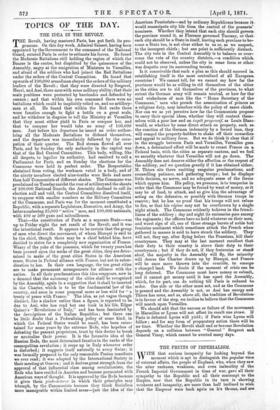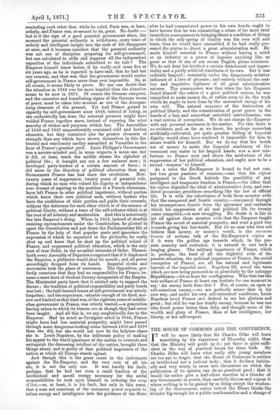THE FRUITS OF IMPERIALISM.
WITH that curious incapacity for looking beyond the moment which is apt to distinguish the popular view of external affairs, the people of England, who, when they saw the utter rashness, weakness, and even imbecility of the French Imperial Government in time of war, gave all their sympathy to the Republic and all their contempt to the Empire, now that the Republic in its turn is showing weakness and incapacity,, are more than half inclined to wish that the Emperor were back again on his throne, and are reminding each other that, while he ruled, Paris was, at least, orderly, and France was, or seemed to be, great. No doubt :- but is it the sign of a good parental government when, the moment the parental authority is withdrawn, every trace of orderly and intelligent insight into the ends of life disappears at once, and it becomes manifest that the parental authority was not one of discipline preparing for self-government, but one calculated to stifle and suppress all the independent capacities of the individuals submitted to its rule I The Emperor himself knew better, if he really said some five or six years ago, as he is reported to have said, that he had but one remorse, and that was, that his government would render self-government in France more than ever impossible. So, at all events, it seems likely to prove. No one can doubt that the situation in 1848 was far more hopeful than the situation seems to he now in 1871. Of course the German conquest, and the excessive and humiliating rigour of the German terms of peace, must be taken into account as one of the disorgan- izing elements of the present. Yet had France gained in capacity for self-government since 1848, instead of losing, as she undoubtedly has done, the external pressure might have welded France together anew, instead of exposing the utter anarchy of wishes and purposes within her. The Assemblies of 1848 and 1849 unquestionably contained wild and lawless elements, but they contained also far greater elements of strength than any which have shown themselves in this dis- tracted and reactionary medley assembled at Versailles in the hour of France's greatest peril. Louis Philippe's Government was a narrow-minded and, in some respects, a mean one, but it did, at least, teach the middle classes the alphabet of political life ; it brought out not a few eminent men ; it developed party-leaders of a certain amount of force ; it did more in the direction of political education than any Government France has had since the revolution. Now, twenty years of suppression, twenty years of parental rule, during which no man who valued his dignity or independence ever dreamt of aspiring to the position of a French statesman, have left France in utter political impotence, without parties which know their own political ends, without leaders who have the confidence of their parties and guide their counsels, without the deference for each other which is of the essence of political liberty, without a trace of the self-reliance which is at the root of all sobriety and moderation. And this is notoriously the late Emperor's doing. When, in 1851, instead of steadily resisting en,croachments under the Constitution, he plotted to upset the Constitution and put down the Parliamentary life of France by the help of that popular panic and ignorance the expression of which he organized in the plebiscite, he really shut up and knew that he shut up the political school of France, and suppressed political education, which is the only root of true Order, in the so-called interests of Order. Thence- forth every Assembly of Deputies recognized that if it displeased the Emperor, a plebiscite would shut its mouth ; and all power accordingly dropped from its hands. Imperial clerks and secretaries took the place of statesmen. The Opposition, per- fectly conscious that they had no responsibility for France, be- came a mere knot of virulent literary antagonists of the Empire. The Ministerial party knew that it existed only to support the throne ; the tradition of political responsibility and party bonds was lost ; the half-learned lesson of self-government was utterly forgotten ; and the experience, valuable enough of its kind, nar- row and limited as that kind was, of the eighteen years of middle-, class government in France, was utterly wasted,—a generation having arisen to which its lessons are as though they had never been taught. And all this is, we say, emphatically due to the Emperor. Had he acted as Cavaignac acted in 1848, France might have had less material prosperity, might have passed through more dangerous-looking crises between 1850 and 1870 than she did, but she would not now be the helpless chaos she is. Louis Napoleon, by the deliberate policy of making his appeal to the timid ignorance of the nation to overrule and extinguish the discussing intellect -of the nation, brought these things about, and is guilty of that political impotence of the nation at which all Europe stands aghast.
And though this is the great count in the indictment against the Ex-Emperor, and the very root of all his
sin, it is not the only one. It was hardly his fault, perhaps, that he had not even a small fraction of the intellectual and moral energy necessary for the awful responsibilities he took upon himself in ordering the coup d'etut,—or, at least, it is his fault, but only in this sense, that a man not conscious of the enormous power requisite to infuse energy and intelligence into the guidance of the State after he had concentrated power in his own hands, ought to have known that he was committing a crime of far more fatal immediate consequences in bringing about a condition of things in which the only spring of vitality was his own will and brain, than he would have committed if he had really pos- sessed the genius to direct a great administration well. He made himself essential to France without having a mind or an industry or a power of impulse anything like as great as that of any of our recent English prime ministers. We do not deny his intellect a certain detachment and impar- tiality and a partly artificial stateliness of its own. But it was radically languid ; constantly under the dangerously sedative influence of a love of pleasure ; and entirely without the rest- less and impulsive vigilance of all great administrative natures. The consequence was that when the late Emperor found himself the centre of a great political system, he was compelled to make money do, or rather seem to do, the work which he ought to have done by the unwearied energy of his own will. The natural sequence of the destruction of political liberty, and the concentration of great power in the hands of a lazy and somewhat enfeebled valetudinarian, was a vast system of corruption. We do not charge tha Emperor with any personal meanness in the matter. For this there is no evidence, and, as far as we know, his perhaps somewhat artificially-cultivated, yet quite genuine feeling of Imperial dignity, would alone have rendered it impossible for him. to amass wealth for himself. But we do say that his lavish use of money to make the Imperial machinery of Go- vernment run easier in his languid hands, was a new mis- fortune to France over and above the misfortune of the suppression of her political education, and ought now to be a second 'remorse' to himself.
As a ruler the Ex-Emperor is bound to feel not one, but two great passions of remorse,—one that his regime postponed to the Greek kalends the possibility of any intelligent and temperate freedom in France,—the other that his regime degraded the ideal of administrative duty, and ren- dered pecuniary greediness something like the law of official life. It is with the inheritance of both these monster evils that the conquered and frantic country,—conquered through his incompetence, frantic from the ignorance and confusion which his suppression of all real political life for twenty years compelled,—is now struggling. No doubt it is fair to set off against these monster evils that the Emperor taught France the secret of material prosperity, and went a good way towards giving her free-trade. But let no man who does not believe that money, or money's worth, is the summum bonum of nations, talk of the Ex-Emperor's régime as if it were the golden age towards which, in the pre- sent anarchy and confusion, it is natural to cast back a longing glance. The military impotence of France, which is, perhaps, the least of all the frightful evils of the present situation, the political impotence of France, the social corruption of France, are all the natural and legitimate harvest of the imperial seed. Napoleon III. sowed the tares which are now being garnered-in so plentifully by the unhappy Republicans,—let us hope for conflagration. Who that has the true welfare of France at heart can hesitate for one moment to say, An enemy hath done this '? Not, of course, an open or self-conscious enemy,—we are perfectly aware that in his own way, and under his own self-interested conditions, Louis Napoleon loved France and desired to see her glorious and great ; but still he was her deadly enemy, because he was one who loved power better than duty, and thought more of the wealth and glory of France, than of her intelligence, her liberty, or her self-respect.

































 Previous page
Previous page